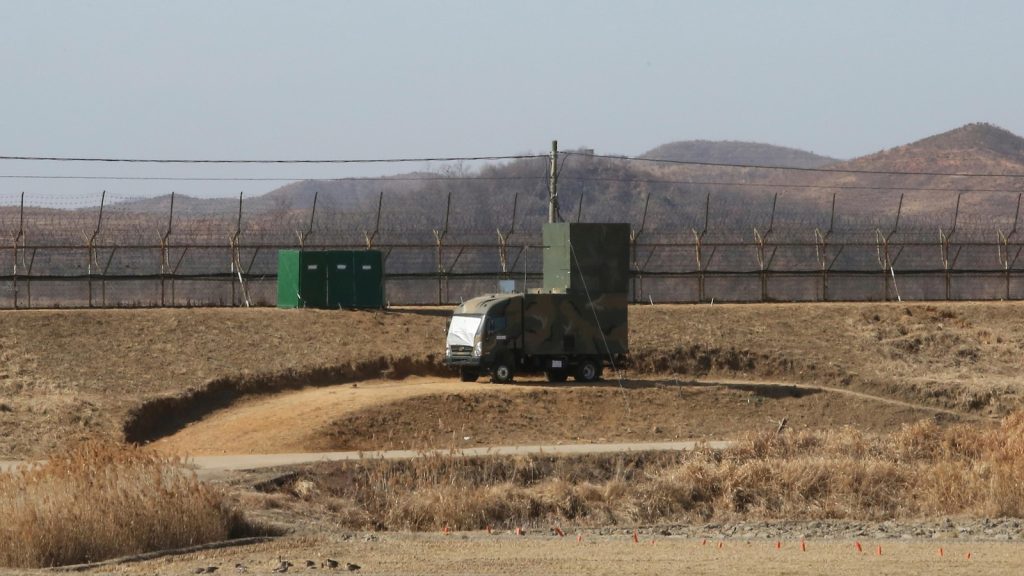SEOUL, South Korea — South Korea’s military has shut down loudspeakers broadcasting anti-North Korea propaganda along the inter-Korean border, marking the new liberal government’s first concrete step toward easing tensions between the war-divided rivals.
The South resumed the loudspeaker broadcasts in June last year following a yearslong pause in retaliation for North Korea flying trash-laden balloons toward the South in a psychological warfare campaign.
South Korea’s Defense Ministry said Wednesday that the move was part of efforts to “to restore trust in inter-Korean relations and promote peace on the Korean Peninsula.”
North Korea, which is extremely sensitive to any outside criticism of its authoritarian leadership and its third-generation ruler, Kim Jong Un, didn’t immediately comment on the step by Seoul.
From May to November last year, North Korea flew about 7,000 balloons toward South Korea in 32 separate events to drop substances such as wastepaper, cloth scraps, cigarette butts and even manure. The North said that its balloon campaign came after South Korean activists sent over balloons filled with anti-North Korean leaflets, as well as USB sticks filled with popular South Korean songs and dramas.
Trash carried by at least one North Korean balloon fell on the South Korean presidential compound in July, raising concerns about the vulnerability of key South Korean facilities. Officials said that the balloon contained no dangerous material and no one was hurt.
South Korea, in response to the North Korean balloons, reactivated its front-line loudspeakers to blast propaganda messages and K-pop songs toward the North. The playlist was clearly designed to strike the nerve of Pyongyang, as Kim’s government since the COVID-19 pandemic has been intensifying a campaign to eliminate the influence of South Korean pop culture and language among the population in a bid to strengthen his family’s dynastic rule.
The Cold War-style psychological warfare campaigns added to tensions fueled by North Korea’s growing nuclear ambitions and South Korean efforts to expand joint military exercises with the United States and strengthen three-way security cooperation with Japan.
South Korea’s new liberal president, Lee Jae-myung, who took office last week after winning an early election to replace ousted conservative Yoon Suk Yeol, has vowed to improve relations with Pyongyang, which reacted furiously to Yoon’s hard-line policies and shunned dialogue.
During the election campaign, Lee promised to halt the loudspeaker broadcasts, arguing that they created unnecessary tensions and discomfort for South Korean residents in border towns. In recent months, those residents had complained about North Korea’s retaliatory broadcasts, which included howling animals, pounding gongs and other irritating sounds.
In a briefing on Monday, South Korea’s Unification Ministry, which handles inter-Korean affairs, also called for South Korean civilian activists to stop flying anti-North Korean propaganda leaflets across the border. Such activities “could heighten tensions on the Korean Peninsula and threaten the lives and safety of residents in border areas,” said Koo Byoungsam, the ministry’s spokesperson.
In his inaugural address last week, Lee vowed to reopen communication channels with North Korea to ease tensions. But prospects for an early resumption of dialogue between the rival Koreas remain dim, as North Korea has consistently rejected offers from South Korea and the United States since 2019, when nuclear talks between Washington and Pyongyang collapsed over sanctions-related disagreements.
North Korea’s priority in foreign policy is now firmly with Russia, which has received thousands of North Korean troops and large amounts of military equipment in recent months for its war with Ukraine.
Yoon, who was removed from office in April over his short-lived imposition of martial law in December, had focused on strengthening military partnerships with Washington and Tokyo and on securing stronger U.S. assurances of a swift and decisive nuclear response to defend the South against a North Korean attack.
In a fierce reaction to Yoon’s policies, Kim in January 2024 declared that he was abandoning the long-standing goals of a peaceful unification with the South and instructed the rewriting of the North’s constitution to cement the South as a permanent “principal enemy.”


